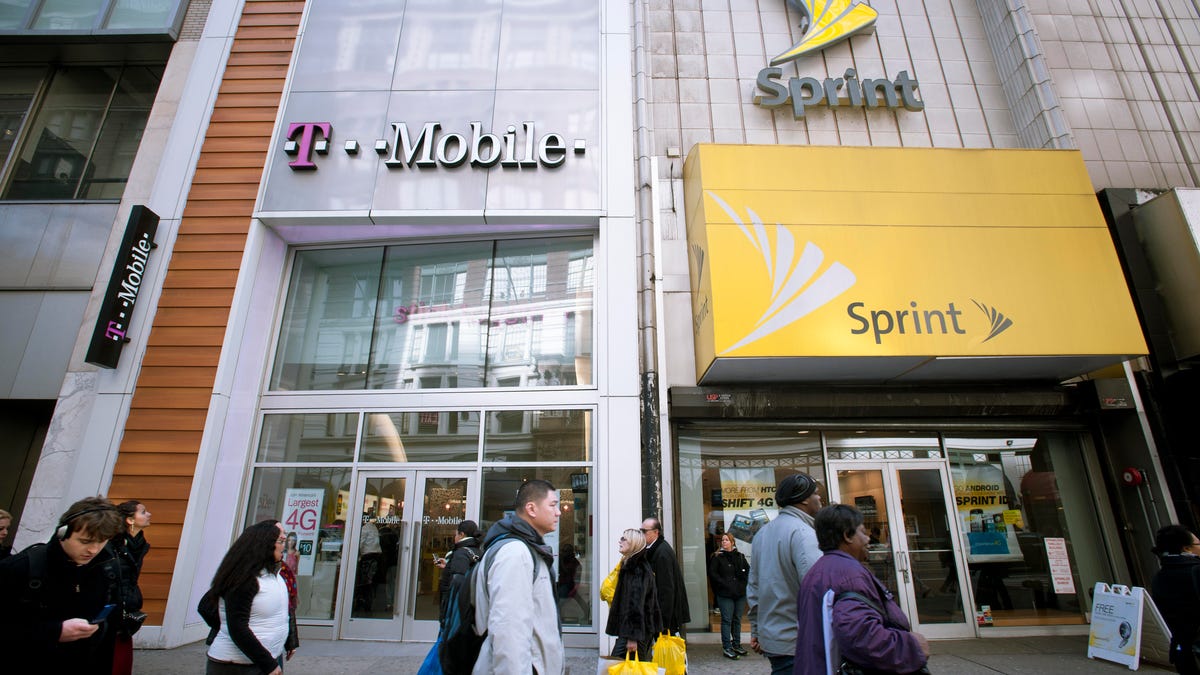Colorado backs out of lawsuit to stop $26 billion T-Mobile Sprint merger
But New York's attorney general and 15 others vow to continue the fight.

All that stands in the way of the $26.5 billion merger between T-Mobile and Sprint is a multistate lawsuit that argues the deal will harm wireless competition and lead to higher prices for consumers.
Colorado is the second state to drop its lawsuit to stop the $26.5 billion merger between T-Mobile and Sprint. It's the latest news in the ongoing saga surrounding the merger of T-Mobile and Sprint, a deal announced more than a year ago aimed at helping the companies combat wireless heavyweights AT&T and Verizon.
On Monday, the Colorado Attorney General's office announced it had struck a deal with T-Mobile and Dish Network, which has agreed to buy assets that will be divested as a condition of the merger. As part of the deal with Colorado, Dish also promised to add 2,000 jobs to the state, and T-Mobile pledged to deploy 5G service across much of the state, including rural areas, according to a press release.
"The State of Colorado joined a multistate lawsuit to block the T-Mobile-Sprint merger because of concerns about how the merger would affect Coloradans," Chief Deputy Attorney General Natalie Hanlon Leh said in a statement. "The agreements we are announcing today address those concerns by guaranteeing jobs in Colorado, a statewide buildout of a fast 5G network that will especially benefit rural communities, and low-cost mobile plans."
Mississippi also withdrew from the lawsuit on Oct. 9.
But New York Attorney General Leticia James, who is leading the lawsuit along with attorneys general from California and Texas, has vowed to see the case through.
"The Colorado settlement reflects Colorado-specific issues and priorities that do not remedy the nationwide harms from the merger of T-Mobile and Sprint," she said in a statement emailed to CNET. "We remain committed to challenging this merger, and have continued to develop strong evidence that it is bad for consumers, bad for workers, and bad for innovation."
The Federal Communications Commission and the Justice Department have each signed off on the merger. But their approvals come with conditions. As part of a settlement with the Justice Department, Dish has agreed to acquire Sprint's prepaid businesses and spectrum for $5 billion, as well as get access to T-Mobile's network as part of a settlement with the wireless carriers. The deal would set up Dish to be the fourth nationwide wireless carrier, preserving the government's goal of having four competitors in the market.
Now the biggest hurdle standing in the way of the merger is the lawsuit. Even with the defections from Colorado and Mississippi, attorneys general in 15 states and the District of Columbia are still trying to block the deal. The lawsuit, filed in June by 10 states, alleges that the merger would "deprive consumers of the benefits of competition and drive up prices for cellphone services." The suit was filed in New York federal court in coordination with Colorado, the District of Columbia, Maryland, Michigan, Mississippi, Connecticut, Virginia, and Wisconsin. The trial is set to begin in Manhattan on Dec. 9.
The merger combining the No. 3 and No. 4 national operators in the US would drastically change the mobile market. Dish's emergence as a new wireless player would provide consumers another potential alternative for service -- it vows to cover 70 percent of the US with 5G by 2023. Assets from T-Mobile and Sprint could also help accelerate Dish's 5G ambitions, which could push the industry further into the next-generation technology.
But in spite of Dish's promises to build out its network, many critics have doubts about the company's commitment given its past reluctance to build out its network.
T-Mobile CEO John Legere said in a tweet Monday that it's "great news" that Colorado has dropped out of the lawsuit.
"CO knows that New T-Mobile will create jobs and deliver 5G to rural areas of the state-and beyond!" he tweeted.
Great news that @COattnyGeneral is coming off the State AG lawsuit and joining @TheJusticeDept settlement! CO knows that New T-Mobile will create jobs and deliver 5G to rural areas of the state-and beyond! Key info: https://t.co/oaVuUfg688
— John Legere (@JohnLegere) October 21, 2019

